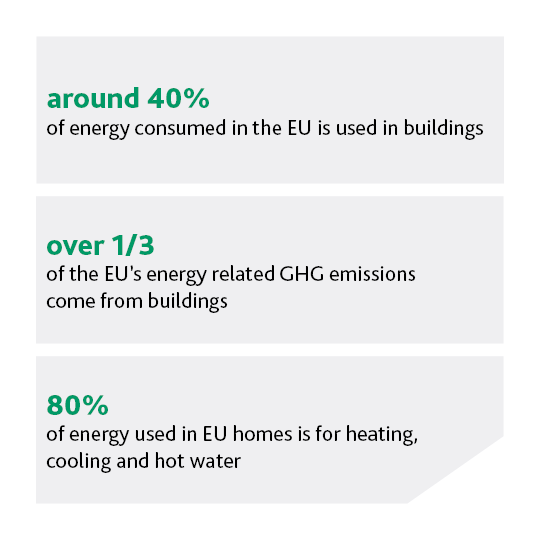The Energy Performance of Buildings Directive (EPBD): What it means for businesses and the built env
The Energy Performance of Buildings Directive (EPBD): What it means for businesses and the built env
At this year’s Provada—one of the Netherlands’ leading real estate events—the Energy Performance of Buildings Directive (EPBD) emerged as a key topic of conversation. With the European Union intensifying its push for sustainability and energy efficiency, the EPBD is becoming a cornerstone in the transition toward a greener built environment. BDO was present at Provada, engaging with industry leaders and stakeholders on how the revised directive will shape the future of real estate. In this article, we take a closer look at what the updated EPBD entails, why it’s so important, and how it aligns with the services and expertise BDO offers in this evolving landscape.
Failure to implement the directive can lead to infringement proceedings by the European Commission, including potential legal action and financial penalties. At the individual or business level, non-compliance may result in fines, denial of building permits, or reduced access to green financing and subsidies.Hence, early compliance is encouraged as it offers a competitive edge within the market and encourages proactive investment in energy efficiency and sustainable building practices.
For more information, please visit: Energy Performance of Buildings Directive or Directive - EU - 2024/1275 - EN - EUR-Lex
What is the EPBD?
The EPBD is a key piece of EU legislation aimed at improving the energy performance of buildings across Europe. Buildings are responsible for approximately 40% of the EU’s energy consumption and over a third of its greenhouse gas emissions. The directive sets a long-term vision: a zero-emission building stock by 2050. To achieve this, the EPBD promotes energy-efficient renovations, the use of smart technologies, and the integration of renewable energy sources in buildings.
.png)
Source: European Commission (Energy Performance of Buildings Directive)
What’s new in the 2024 revision (EU/2024/1275)?
The latest revision, which came into force in May 2024, introduces several ambitious measures:- Renovation of worst-performing buildings: Member states must prioritize upgrades to the lowest-performing 16% of buildings, both residential and non-residential.
- Digitalization and smart readiness: Encourages the use of digital tools to monitor and optimize energy use.
- Sustainable mobility: Requirements for EV charging infrastructure in new and renovated buildings.
- Indoor air quality: New standards to ensure healthier indoor environments.
- Social safeguards: Measures to protect vulnerable groups and prevent rent increases due to renovation costs.
Implications for businesses and real estate
The EPBD is set to reshape the real estate landscape across Europe. For property owners, developers, and investors, it introduces a new level of compliance pressure through stricter minimum energy performance standards, making proactive renovation strategies essential. At the same time, it opens the door to financial opportunities, including access to green financing, subsidies, and tax incentives for projects that meet the directive’s criteria. Energy performance is also becoming a more prominent factor in property valuation and investment risk assessments. Moreover, the EPBD’s emphasis on digital tools and smart technologies reflects a broader shift toward data-driven decision-making, where real-time energy monitoring and transparent reporting are no longer optional, but expected.Who must comply with the EPBD and how it’s enforced
The EPBD applies to a wide range of stakeholders across the European Union. Member States are primarily responsible for transposing the directive into national legislation and ensuring its implementation. The directive also directly impacts building owners, developers, public authorities, and businesses. In particular, those:- Owning worst-performing buildings (bottom 16% in energy performance)
- constructing new properties
- undertaking major renovations
Failure to implement the directive can lead to infringement proceedings by the European Commission, including potential legal action and financial penalties. At the individual or business level, non-compliance may result in fines, denial of building permits, or reduced access to green financing and subsidies.Hence, early compliance is encouraged as it offers a competitive edge within the market and encourages proactive investment in energy efficiency and sustainable building practices.
Challenges and opportunities
Despite its promise, the directive presents real challenges—particularly for SMEs and owners of older building stock. High upfront renovation costs, limited technical knowledge, and a lack of awareness can all hinder progress. However, these obstacles also create space for innovation. Solutions such as modular retrofitting, AI-powered energy management systems, and integrated building data platforms are gaining traction. The path forward will require collaboration between public and private sectors, as well as a willingness to embrace new technologies and business models that can accelerate the transition to a low-carbon built environment.Supporting the transition
As the EPBD drives a new era of accountability in building performance, organizations will need to quantify greenhouse gas emissions and energy use with greater precision. This is where BDO can help. Our multidisciplinary teams support clients in navigating the directive’s requirements—from sustainability and ESG advisory to real estate consulting, tax and incentive strategies, and risk management. We help clients not only comply with evolving regulations but also unlock value through better data, smarter investments, and more resilient assets. By focusing on robust GHG and energy quantification, we enable businesses to make informed decisions that align with both regulatory expectations and long-term sustainability goals.For more information, please visit: Energy Performance of Buildings Directive or Directive - EU - 2024/1275 - EN - EUR-Lex
